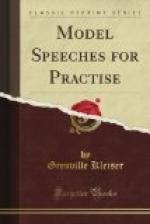By the memory of our murdered president, let us resolve to cultivate and preserve the qualities that made him great and useful; and let us determine to meet the call of patriotic duty in every time of our country’s danger or need.
DECORATION DAY[5]
BY THOMAS W. HIGGINSON
Friends:—We meet to-day for a purpose that has the dignity and the tenderness of funeral rites without their sadness. It is not a new bereavement, but one which has softened, that brings us here. We meet not around a newly opened grave, but among those which Nature has already decorated with the memorials of her love. Above every tomb her daily sunshine has smiled, her tears have wept; over the humblest she has bidden some grasses nestle, some vines creep, and the butterfly,—ancient emblem of immortality—waves his little wings above every sod. To Nature’s signs of tenderness we add our own. Not “ashes to ashes, dust to dust,” but blossoms to blossoms, laurels to the laureled.
The great Civil War has passed by—its great armies were disbanded, their tents struck, their camp-fires put out, their muster-rolls laid away. But there is another army whose numbers no Presidential proclamation could reduce, no general orders disband. This is their camping-ground—these white stones are their tents—this list of names we bear is their muster-roll—their camp-fires yet burn in our hearts.
I remember this “Sweet Auburn” when no sacred associations made it sweeter, and when its trees looked down on no funerals but those of the bird and the bee. Time has enriched its memories since those days. And especially during our great war, as the Nation seemed to grow impoverished in men, these hills grow richer in associations, until their multiplying wealth took in that heroic boy who fell in almost the last battle of the war. Now that roll of honor has closed, and the work of commemoration begun.
Without distinction of nationality, of race, of religion, they gave their lives to their country. Without distinction of religion, of race, of nationality, we garland their graves to-day. The young Roman Catholic convert who died exclaiming “Mary! pardon!” and the young Protestant theological student, whose favorite place of study was this cemetery, and who asked only that no words of praise might be engraven on his stone—these bore alike the cross in their lifetime, and shall bear it alike in flowers to-day. They gave their lives that we might remain one Nation, and the Nation holds their memory alike in its arms.
And so the little distinctions of rank that separated us in the service are nothing here. Death has given the same brevet to all. The brilliant young cavalry general who rode into his last action, with stars on his shoulders and his death-wound on his breast, is to us no more precious than that sergeant of sharpshooters who followed the line unarmed at Antietam, waiting to take the rifle of some one who should die, because his own had been stolen; or that private who did the same thing in the same battle, leaving the hospital service to which he had been assigned. Nature has been equally tender to the graves of all, and our love knows no distinction.




